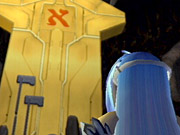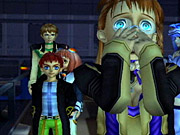No other single game to date is as story-driven as Xenosaga Episode I: Der Wille zur Macht, a rather conventional RPG at its core, but one with an exhaustively detailed and occasionally long-winded narrative. Playing through Xenosaga involves watching an inspired anime sci-fi miniseries unfold, as the game packs in literally hours upon hours of noninteractive 3D cutscenes. Often, you do more watching than playing, so if you're the sort who gets frustrated at having to sit through cutscenes, then do yourself a favor and don't bother with this game. Also, the emphasis on story means that Xenosaga isn't always the most riveting gameplay experience. However, the story is what will prove to be the main attraction for many fans of the genre--especially for fans of Xenogears, a daring 1998 RPG published by Square that, like Xenosaga, is long, complex, and heavily focused on storytelling. Both games' stories touch on some decidedly sensitive subjects, most notably by making numerous allusions to various religious faiths--and in this case, all in the context of a sweeping, melodramatic space opera. Not everyone will enjoy Xenosaga, but serious fans of RPGs or anime almost certainly will. Regardless, Xenosaga is by all means an impressive and genuine effort, one that legitimately deserves both praise and attention.

Published by Namco rather than Square but designed by the same developers as Xenogears, Xenosaga isn't directly related to Square's cult classic, but the similarities between these games will be unmistakable to those who remember Xenogears. Xenosaga is a science-fiction-themed game set thousands of years in the future, when humankind is being threatened by a mysterious, ethereal alien menace called the gnosis. Shion Uzuki is a young scientist heading up the development of a female android equipped to deal with these bizarre monstrosities. To say much more about the story would be to give away some of its surprises, but suffice it to say that some surprising events bring Shion and her android creation into league with some other unusual characters who, coincidentally or not, are headed to the same destination. Along the way, they will face the wrath of the gnosis, a number of shadowy political factions, a deranged and masochistic villain, and more in a story that's rife with intrigue. All this unfolds in cutscenes that sometimes go on for more than 30 minutes at a time, so thankfully you can pause them. Unfortunately, you can't turn off the subtitles, even though the cutscenes feature full speech.
Its strong cast of characters is one of the best things about Xenosaga. Shion is pretty straightforward as a heroine, though maybe a little ditzy for someone who's supposedly one of the best scientists in the galaxy. But some of the other main characters are really good, like Ziggurat-8 (later just Ziggy), a melancholy cyborg mercenary who seeks only to rid himself of the last remnants of his humanity by systematically replacing his remaining biological parts with machinery. He seems to get a new lease on life when he meets MOMO and becomes like a father figure to her. MOMO looks and acts like a young girl, but is actually a realian--a manufactured humanoid like Blade Runner's replicants, only with mysterious and highly sought-after powers. Then there's chaos, an enigmatic but kind young man who appears to be an angel. And there's also the one who calls himself Junior, who is seemingly a young boy with a penchant for action movies, but is also the captain of an immensely powerful starship. Some of the other characters you'll run across during the course of Xenosaga may not play major roles, but are still well defined and memorable. Despite the amount of time you'll spend with all these characters, Xenosaga isn't very heavy on character development, but its cast is endearing nevertheless.

How religious references come into play in a game that's otherwise filled with monsters, giant robots, and science-fiction conventions isn't made entirely clear. The game's use of things like images of crucifixes, the Hebrew alphabet, the number 666, and direct references to the Bible and cabala seem as though they're in there for shock value as much as anything else. Some may be offended by this stuff, while others may find it creepy, along with the game's subtitle, which translates as "The Will to Power" and appears to be a reference to the work of German philosopher Friedrich Nietzsche. Others will probably think it's cool. It's definitely unusual material to see in a role-playing game.
Conventional console role-playing games tend to be padded out by forcing you to fight your way through numerous random encounters with enemies. Even Xenogears was like this, but Xenosaga has no random battles at all, as if the designers put in all those cutscenes as an alternative. Not a bad trade-off, since Xenosaga is undeniably substantial, though it tries not to bog you down with its combat system. Even when you're actually playing the game rather than watching it, oftentimes you'll find yourself exploring areas that are completely devoid of danger. Actually, these sequences sometimes fall flat, and at worst are boring and bewildering, since you won't always have a clear-cut objective and may find yourself running around in environments wondering exactly what you're supposed to be doing. When you do find yourself in enemy-infested areas, you'll see those enemies patrolling the map and can often sneak right past them, avoiding battle completely. The game's battle system is as complicated as it is deep, and it's reminiscent of the flashy, rather slow-paced combat systems of recent Final Fantasy installments. And while Xenosaga doesn't shove random encounters down your throat, that's not to say the combat doesn't ever get repetitive.
You can have up to three characters in your party during a fight, and you take turns slugging it out with your enemies much like in most other RPGs. Characters can use close-range attacks and long-range attacks, various special moves, and ether powers, which are basically magic spells. In a nod to the combat system of Xenogears, characters can execute combinations of moves in a single round, and by delaying your actions for a turn, you can make a character unleash his or her most powerful attacks. Friends and foes alike take their turns according to their initiative, but as you successfully attack, your characters gain the ability to boost themselves up to the front of the line for extra turns. You'll also have to keep your eye out for numerous debilitating effects that can afflict your characters and learn to identify your foes' vulnerabilities to different types of damage. Other than that, the two sides just slug it out and heal themselves when they're injured, same as in most any role-playing game, though the combat is rather more strategic here. Battles later in the game can be quite tough, so you'll have to make every action count.

Another twist, and another reference to Xenogears, lies in the way some of your characters can climb into the cockpit of their very own giant robot during battle. These are very strong, with huge rifles, missile pods, and energy swords, and they can soak up lots of damage. They're balanced out because you lose a turn when you switch over to using them, and they can't easily be repaired in the thick of battle. You'll buy new and improved parts for your robots during the course of the game, which turns out to be a lot of fun, as the various weapons and other improvements you can purchase are numerous yet expensive, and they can make a dramatic difference in battle. The robots themselves look great, but they're too static--they just stand there silently behind your other characters, and they simply disappear when you aren't using them. They do liven the combat up, however, and they seem about as powerful as you'd probably hope.
Characters in Xenosaga gain experience points and level up by fighting, just like in any RPG. The complicated part is that they also earn ether points, tech points, and skill points, which you need to actively spend in order to improve your characters' stats, special attacks, abilities, and spells. Ether points are especially difficult to manage, as they're in short supply but can be used to improve a character's core attributes, learn new ether powers, or transfer ether powers between characters. Tech points are also very important, since they can be used to greatly enhance a character's special attacks. Keeping track of and judiciously spending all these different points will be interesting for those who really like to delve deep into an RPG's character-building system, but it's also a pretty cumbersome process. In all, Xenosaga's character-development system offers some interesting choices, but it will take you some time before you get a good grip on how it works.
Xenosaga is a great-looking game, featuring an expressive cast that's realistically animated, though unfortunately the characters' lips don't sync with their speech. The cutscenes are generally done very well and entertaining to watch. The anime influence is obvious, as even though the sequences make consistent use of 3D models, the characters look much like the hand-drawn personae you might find in a sci-fi-themed anime series such as Evangelion. Many of Xenosaga's environments are imaginative and detailed, and while some of them are confusingly laid out, the game's camera angles always grant a good vantage point of the situation. The combat sequences look very good, replete with plenty of bright, flashy special effects and close-ups of characters in their win poses.

The audio in Xenosaga is mostly very good, but it's disappointing in some ways. The most glaring problem is the relative lack of music in the game. When you do hear a soundtrack, such as during cutscenes or during battle, it tends to be a perfectly suitable and remarkably good orchestral composition (though there's this one really bad lounge tune that's reused several times too often). However, most gameplay sequences in Xenosaga actually have no musical accompaniment whatsoever. What could have been an opportunity to heighten the game's atmosphere instead works against Xenosaga's efforts to immerse you in its different locations. All of Xenosaga's cutscenes are dubbed in English, and there are some mixed results here as well, as some characters' voices are great, while others are certainly not. The script itself is actually the real culprit half the time, since Xenosaga's occasional attempts at comic relief, some of its more melodramatic moments, and its occasional overindulgence in technobabble really aren't successful.
There's a lot to see and do in Xenosaga, and those who really get into it will find numerous side quests, minigames, and secrets to discover. You're also able to revisit any places you've been, scouring them for items that might have eluded you the first time out. And of course, Xenosaga packs in the equivalent of an entire season of a good anime series. The game takes a lot of risks, and its considerable emphasis on cutscenes does undermine its pacing to some extent, often making it feel disjointed, like half of it's a movie and half of it's an RPG. Nevertheless, Xenosaga is an original and memorable entry in a genre that's been mostly stagnant for years now, and the game is clearly a labor of love, filled with many intense and remarkable moments. And that's more than enough to recommend it to anyone looking for a truly great role-playing game.